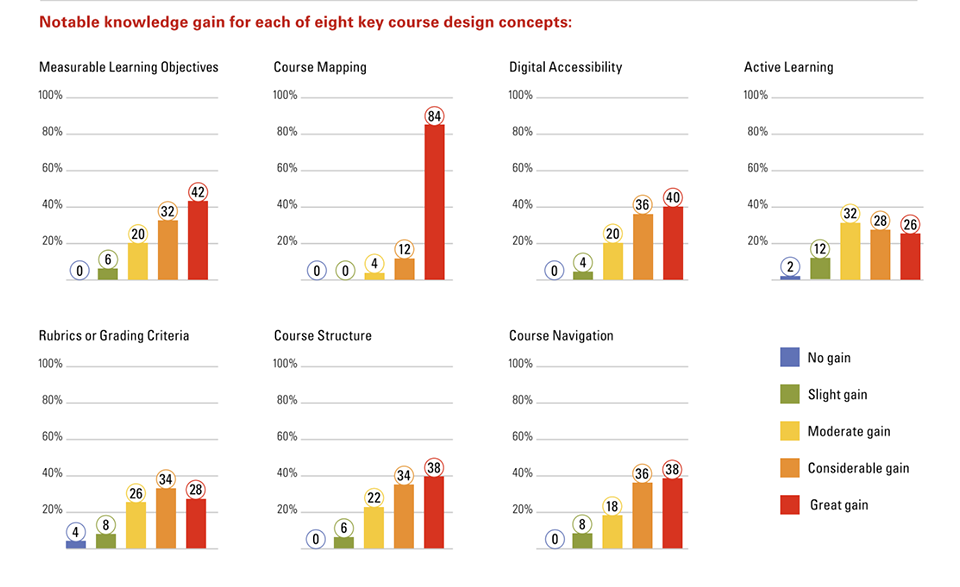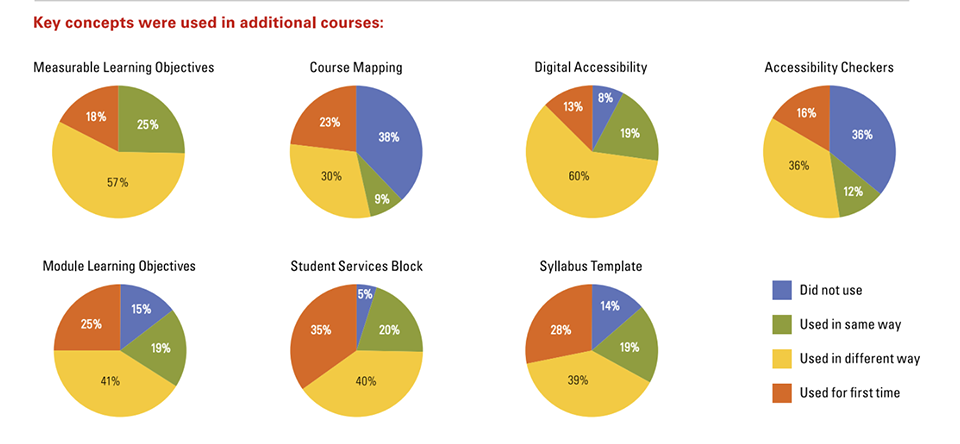Course Design Training Proves Impactful
Recent Study Shows Applying Quality Matters Concepts and Tools Results in Promising Outcomes

Authors: Rebecca Sanchez and Bethanne Winzeler
The Course Quality (CQ) Program at DELTA supports a variety of opportunities for faculty to apply instructional design best practices to their online courses under the Quality Matters framework.
Quality Matters (QM) is an organization that aims to ensure quality assurance for courses in various modalities and includes a comprehensive rubric that consists of 44 standards for higher education course design, expert peer review, and official certification of quality.
A recent study by CQ team members Senior Instructional Designer Rebecca Sanchez and Associate Director of Course Quality Bethanne Winzeler measured the impact of QM training on instructor knowledge and the application of course design concepts and tools to subsequent courses. This study focused on several key course design concepts:
- Writing measurable learning objectives
- Course mapping
- Digital accessibility
- Active learning
- Rubrics or grading criteria
- Course structure
- Course navigation
Results of the Study
The results of the study were promising, as faculty reported substantial knowledge gains in each of these key concepts. Additionally, the majority of respondents indicated that they used these concepts or tools for the first time or in a different way in additional courses. This information suggests that QM training not only increases instructor knowledge but also encourages applying this knowledge to improve course design across different classes.

As online courses become increasingly a part of the typical student experience, instructors are realizing the unique design aspects of such courses and the importance of ensuring that their courses meet the necessary quality and effectiveness to ensure student success. QM’s standards, grounded in instructional design and cognitive psychology theories, provide a framework for creating engaging and successful online courses.
DELTA offers a Course Improvement Grant to facilitate instructors’ understanding and application of QM standards. This grant involves a deep exploration of each standard, practice with applying the standard to a course, and collaboration with mentors and peers. To date, 65 faculty members have completed a Course Improvement Grant and obtained Quality Matters certification for their courses, and over 11,000 students have enrolled annually in a QM certified course.
The impact of Course Improvement Grants goes beyond the individual course modified as part of the program. Faculty who have mastered online course design best practices are likely to apply these practices to additional courses, thereby improving the overall quality of online education offerings. The study measured this impact and found that faculty reported a significant increase in knowledge and the application of course design concepts and tools.

The study also investigated barriers to additional application of course design concepts and tools. The most common barrier, noted by about one third of faculty, was a lack of time, which is consistent with previous findings. However, most faculty participants did not indicate any barriers to further application, suggesting that they feel confident in using what they have learned to improve their courses.
Overall, training based on the QM framework is having a positive impact on faculty knowledge and the application of course design best practices. This, in turn, benefits students by improving the quality and effectiveness of online courses. As online education continues to grow, course design training opportunities for instructors are crucial in ensuring that they are equipped to create engaging and successful online learning experiences for their students.
We encourage faculty interested in improving an online or blended course, receiving QM certification, or learning transferable course design skills to apply for a Course Improvement Grant for academic year 2024-2025.
Proposals for the next round of Course Improvement Grants will be accepted April 15 through May 10.


